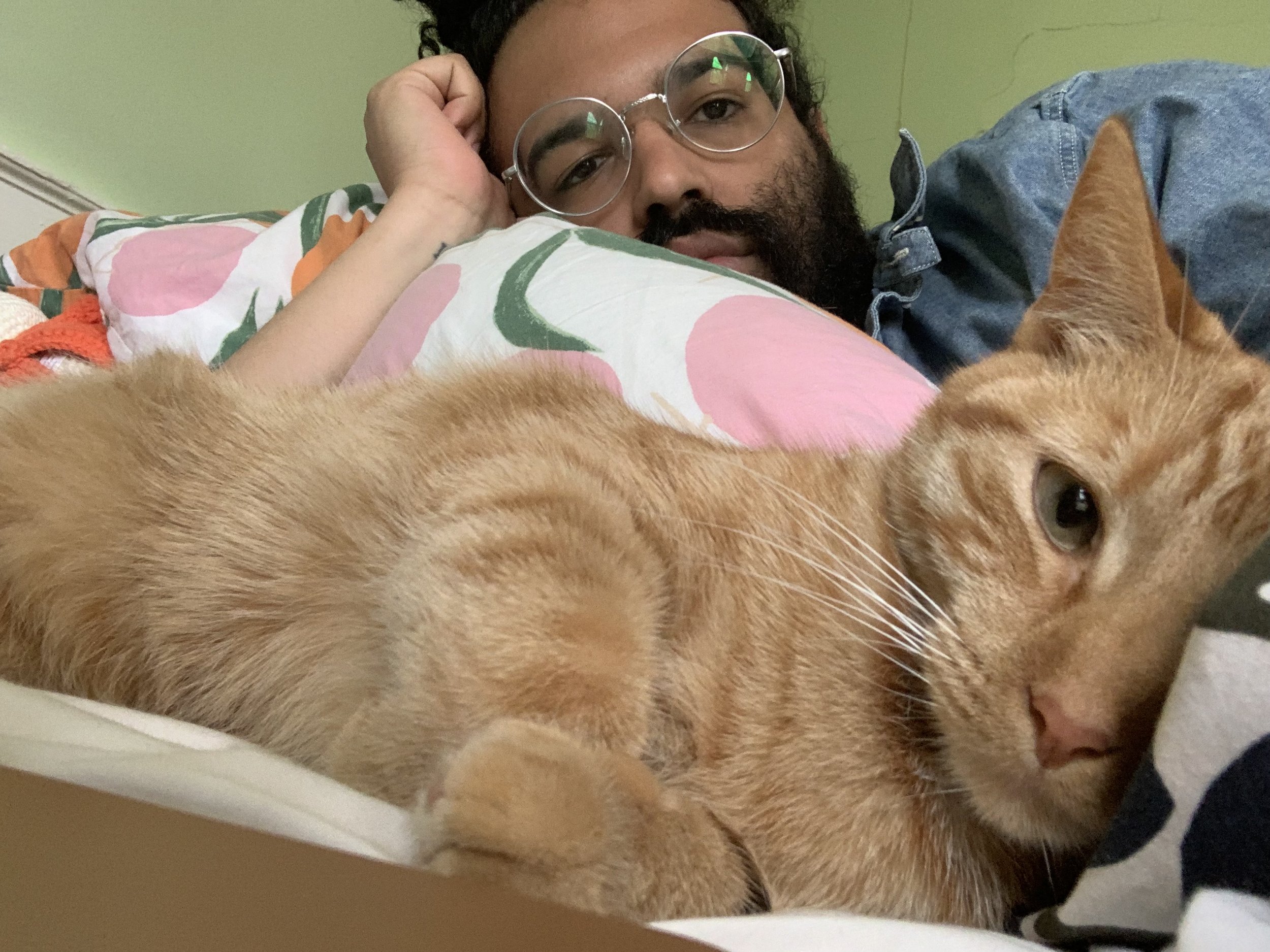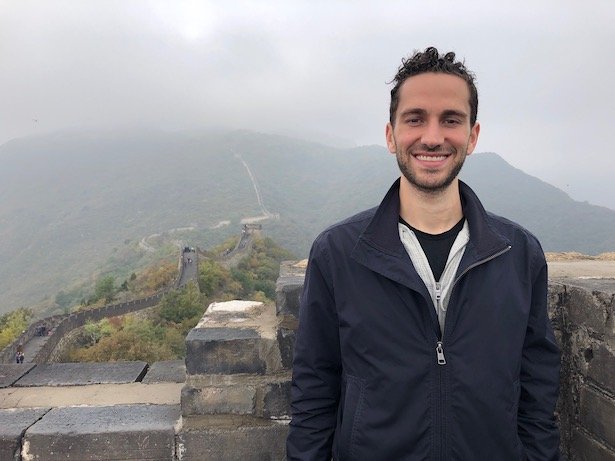“Holding Hands in the Dark:” Reflections on CPE
Emma Markham, Rafael Diaz, and Alex Sarkissian—all 2nd year BIE MDiv students—reflect on their recent CPE experiences.
Emma Markham (she/her) MDiv BIE ‘24
I did my first unit of CPE at Lenox Hill Hospital this summer (2022). I served on a cardiovascular unit and an oncology/end of life unit. The placement was gifted to me. The program I was set up to do fell through at the last minute, and Lenox Hill was the only site in NYC with an opening. It was challenging on many levels, but a theme that stayed with me throughout the experience was the total ease and comfort I felt with patients who were dying.
I have long suspected that I would enjoy working with dying people and CPE confirmed that for me. One of the biggest areas of growth I identified related to interfaith service. I struggled with my place in an interfaith (but entirely monotheistic, except myself) team, and I still question how to pray to God with/for/alongside patients while maintaining my authentic spiritual connection to the person or people I am with. My CPE experience left me with many more questions about the role of chaplaincy in my professional life, what it satisfies in me and what it doesn’t, where it challenges me for the better, and where it leaves me needing something else. Overall, it feels like a beginning, and I look forward to continuing to explore this complex, fascinating, demanding, beautiful, and humbling work.
Rafael Diaz (they/he) MDiv BIE ‘24
I’m part of the hybrid Field Ed/CPE cohort, interning as a community chaplain for my sangha, Bhumisparsha. We’re an online sangha, which truly accommodates my needs as a commuting student living in Lancaster, PA. I offer 1-on-1 spiritual care sessions via zoom where I constantly bear witness to incredibly sacred moments through the transformative vulnerability that the space invites people to inhabit. I do my best to listen deeply, reflect back what I heard, ask questions to help them go deeper, lean hard into silence (the great facilitator), and offer didactic practice or prayer at the end, all while disciplining myself away from diagnosing problems, prescribing solutions, or even giving advice.
It’s about holding space for people to open to their suffering and respecting their process of struggle. It’s tough, but I have structures for support and guidance through weekly meetings with my FE/CPE cohort and 1-on-1 with my Dharma teacher and theological supervisor, Lama Rod Owens, that have been incredibly beneficial and grounding.
This work is practice in itself in how it requires non-reactivity and deep capacity for compassion, which is holding suffering in love without being moved into suffering myself. It requires me to lean into and deepen my practice for support as well so I can come into sessions fresh and ready to fully support them and so I don’t bring their suffering with me into other sessions or the rest of my life. I’m forced to maintain my daily practice and have even started ritualizing and sacralizing other parts of my life—for example, when I go on long walks after sessions, I ask the Earth to hold the suffering I witnessed so it’s not sticking on me, or for the wind to blow it away. I’ll visualize Water washing it away when washing my hands between sessions or while in the shower, all to acknowledge the intensity of the work and support me in being joyful and stable throughout my personal life. Such stability and ease is necessary for the work to be sustainable and effective.
Being a spiritual caregiver is an absolute honor and privilege. I see it as an extension of my organizing work because, living in apocalypse, we’re going to need people who are able to hold suffering and be creative and flexible amid horrific struggles. I also get to be of benefit to a lot of organizers and careworkers, many of them queer and trans, aiding them in their journey toward wholeness and freedom. But at the end of the day, I want to be awakened as soon as possible for the benefit of all beings—so I can liberate all beings. That means devoting my life to practice while still being realistic and respectful of my personal commitments that mean I won’t go to monastery. Through chaplaincy, I’m able to live out my calling by making my practice my vocation and vice versa.
Alex Sarkissian (he/him) MDiv BIE ‘24
This past summer I did my first unit of CPE (through JTS) at Maimonides Hospital, located in an orthodox Jewish neighborhood of Borough Park, Brooklyn. I was drawn to a hospital environment for my first unit as I felt like it would offer good all-around chaplaincy training with the opportunity to work in different care settings (I was staffed in the ICU, General Surgery, and Residential Psychiatry units). The patient population was racially diverse and relatively religiously diverse (though still mostly Christian). On the Spiritual Care team there were four Jewish rabbis (two orthodox, two conservative), one Catholic priest, and myself.
CPE for me was a 10-week immersion in the First Noble Truth. Though I felt fairly well prepared to stay “in the pit” with my patients coming into CPE, I found it more difficult than expected to resist the sometimes subtle, sometimes not so subtle, desire to point towards the remaining Noble Truths, too. Yes, there is suffering, but there is also release from suffering and a path of practice leading to that release. As much as I sometimes wanted to go there with my patients though, I came to see that that’s not really my role as a chaplain. I also got better at recognizing when this desire to more actively help relieve the suffering of others arose more from my own unwillingness to “stay” rather than genuine compassion.
Coming into CPE, I also underestimated just how much of my own suffering I would be sitting with in addition to the suffering of my patients. On top of it simply being challenging working in a hospital all day, nearly every interaction brought me face to face with my greatest karmic hits: the difficulty in allowing myself to be a “beginner” at something, feeling less “valuable” than other members of the medical staff (e.g., doctors and nurses), struggling with imposter syndrome and my identity as a Buddhist practitioner tending to mostly Christians...the list goes on. Needless to say, doing my best to take care of myself and stay present to my own suffering allowed me to more skillfully meet my patients in theirs.
Overall, CPE has been one of the most fruitful experiences of seminary so far, and I wrapped up my first unit feeling mostly inspired and energized to keep developing my capacity as a chaplain. It helped validate for me why I was drawn to this work in the first place, as it’s hard to imagine a richer, more meaningful ground for practicing Buddhadharma and cultivating seeds of awakening.



